|
The Technical Expert Group fleshed out the scope of a new framework for the environmentally sound management of hazardous wastes and other wastes at its second meeting, held from 30 September to 2 October 2012, in Geneva. The framework is intended as a practical guide for all stakeholders participating in the management of hazardous and other wastes.
Technical Expert Group works to develop framework for environmentally sound management of hazardous wastes and other wastes
The Technical Expert Group mandated to develop a framework for the environmentally sound management (ESM) of hazardous wastes and other wastes fleshed out the scope, objectives and guiding principles of the new framework at its second meeting, held from 30 September to 2 October 2012, in Geneva.
Twenty-four of the 30 international experts nominated by Parties were joined by 18 observers to continue work on the framework that was initiated in Tokyo in April 2012.
The Group agreed that the framework is intended as a practical guide for all stakeholders participating in the management of hazardous and other wastes. The framework will establish a common understanding of the elements of ESM through the provision of standards, criteria andguidelines, define tools to support and promote their implementation and identify strategies to overcome challenges.
The Group discussed what are the main challenges related to the implementation of ESM, among them ensuring a uniform interpretation of ESM, tackling the vexing problem of illegal traffic and ensuring the development of adequate national capacity for ESM.
One further meeting will be held (scheduled from 21 to 23 January 2013 in Glion, outside of Montreux, Switzerland) to further progress the development of the framework which will be considered and possibly adopted at COP 11 of the Basel Convention in April 2013.
|
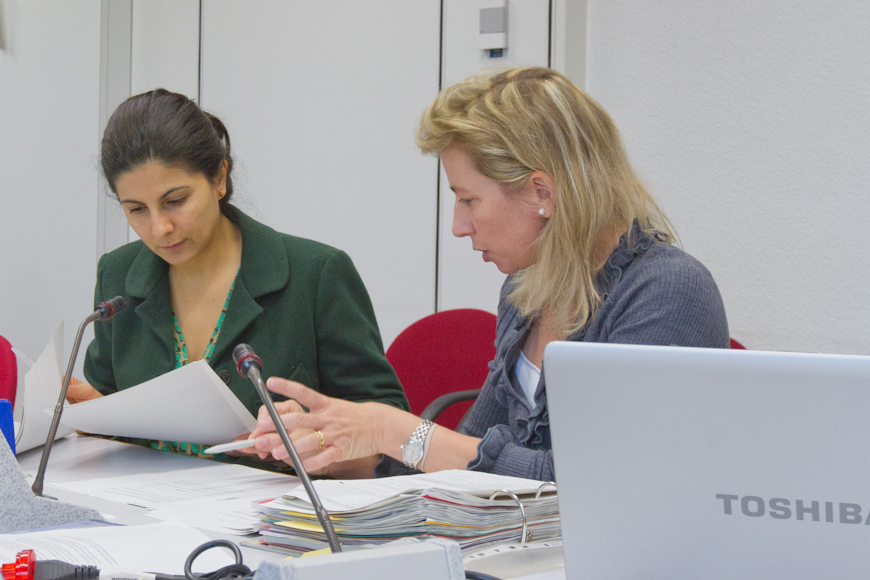 |
ICC approves compliance action plans and allocates funding from Basel Convention implementation fund.
Implementation and Compliance Committee works through parties’ difficulties in complying with national reporting obligations
 The ninth meeting of the Basel Convention Implementation and Compliance Committee took place on 8-9 November 2012 in Geneva, Switzerland.
Following consideration of nine specific submissions, the Committee adopted decisions aimed at resolving each Party's difficulties in implementing and complying with its national reporting obligation. In two of these instances (Bhutan and Togo), the ICC took the unprecedented step of approving compliance action plans and allocated funding from the Basel Convention implementation fund (up to USD 50’000.- each) to undertake activities listed therein. The ICC also considered general issues of implementation and compliance and agreed on conclusions and recommendations pertaining to national legislation, national reporting, illegal traffic, inventories, the control system, as well as insurance, bond and guarantees.
The meeting was chaired by Ms Jimena Nieto (Colombia) and welcomed the attendance of 13 Committee members, three Parties concerned by a specific submission, namely Oman, Bhutan and Togo, as well as a representative of Switzerland in its capacity as President of the eleventh meeting of the Conference of the Parties.
More
|
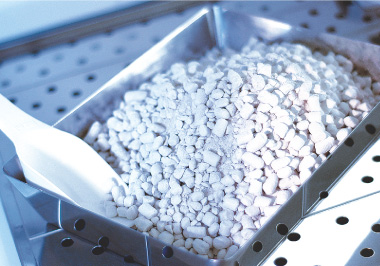 |
Technical guidelines on environmentally sound co-processing of hazardous wastes in cement kilns adopted by the Parties to the Basel Convention at COP10 are available in English, French and Spanish
Co-processing of selected waste streams in properly controlled cement kilns provides energy, material recovery and cost effective options for industry and waste generators
|
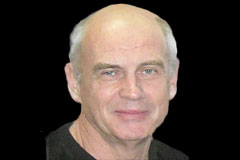 |
The Secretariat of the Basel, Rotterdam and Stockholm Conventions is deeply saddened to learn of the passing of Mr. Sergey Eduardovich Tikhonov.
Message of Condolence to the Family, Friends and Colleagues of the Late Sergey E. Tikhonov
 
Mr. Sergey Eduardovich Tikhonov
(September 23, 1948 - October 26, 2012) The Secretariat of the Basel, Rotterdam and Stockholm Conventions is deeply saddened to learn of the passing of Mr. Sergey Eduardovich Tikhonov, a leader in the Commonwealth of Independent States (CIS) in the field of sound chemicals and waste management. Mr. Tikhonov died in Moscow, Russian Federation, on Friday, 26 October 2012.
Mr. Tikhonov headed the Autonomous Non-Profit Organization Centre for International Projects (ANO-CIP), based in Moscow, and served as director of the Stockholm Convention Regional Centre for capacity-building and transfer of environmentally sound technologies and the Basel Convention Regional Centre for Countries of the CIS.
Over a long and distinguished career, Mr. Tikhonov cooperated with the United Nations Environment Programme on awareness-raising and capacity-building initiatives in support of the chemicals and wastes conventions. He also supported a variety of public right-to-know mechanisms, including Earthwatch / International Register of Potentially Toxic Chemicals (IRPTC) and national Pollutant Release and Transfer Registers.
Sergey Tikhonov’s dedication and inspiring nature will long be remembered by those who were privileged to work with him.
Our Secretariat expresses its heartfelt sympathy to his family, friends and the staff of the Regional Centre in this time of sorrow.
|
 |
More than 200 international waste management experts gathered last week to advance global measures to control the transboundary movement of hazardous and other wastes.
The eighth meeting of the Open-ended Working Group of the Basel Convention on the Control of Transboundary Movement of Hazardous Wastes and Their Disposal met from 25 to 28 September 2012, in Geneva. The Working Group adopted ten separate decisions aimed at strengthening implementation of the leading global treaty governing hazar...
UN experts consider new measures for end-of-life goods destined for recycling or recovery
 4 October 2012, Geneva – More than 200 international waste management experts gathered last week to advance global measures to control the transboundary movement of hazardous and other wastes.
The eighth meeting of the Open-ended Working Group of the Basel Convention on the Control of Transboundary Movement of Hazardous Wastes and Their Disposal met from 25 to 28 September 2012, in Geneva. The Working Group adopted ten separate decisions aimed at strengthening implementation of the leading global treaty governing hazardous wastes. Considerable progress was made in a number of areas, including the further development of technical guidelines on e-waste and wastes containing persistent organic pollutants (POPs).
Jim Willis, Executive Secretary of the Basel, Rotterdam and Stockholm Conventions (UNEP), said:
“The importance of having a strong, focused expert body for the Basel Convention was demonstrated once again last week, as participants grappled with a number of challenging issues on e-waste, ship dismantling, POPs-containing waste, end-of-life goods and the country-led initiative. The outstanding progress achieved is a testament to the dedication of participants to protecting human health and the environment from wastes, and to the excellent chairing skills of Jimena Nieto and Luay Al-Mukhtar.”
Work progressed on technical guidelines for environmentally sound management of wastes containing persistent organic pollutants (POPs), with agreement on covering new POPs added in 2010 to the Stockholm Convention on POPs. The guidelines will further strengthen synergies between the two global conventions. Development of technical guidelines for the environmentally sound management of wastes consisting of, containing or contaminated with commercial octabromodiphenyl ether (hexabromodiphenyl ether and heptabromodiphenyl ether); commercial pentabromodiphenyl ether (tetrabromodiphenyl ether and pentabromodiphenyl ether);and perfluorooctane sulfonic acid, its salts and perfluorooctane sulfonyl fluoride were included in the programme of work of a small intersessional working group.
Experts reviewed technical guidelines on transboundary movements of e-waste, which will be further revised and considered for adoption by the Conference of the Parties, the highest governing body of the Convention, at its eleventh meeting (COP-11) in 2013.
Proposals for new entries to the list of wastes contained in Annex IX to the Basel Convention submitted by Finland, Ireland, and the Netherlands were agreed to be forwarded to the Conference of the Parties for consideration at its eleventh meeting.
As a follow-up to the Indonesian-Swiss country-led initiative to improve the effectiveness of the Basel Convention adopted at the tenth meeting of the Conference of the Parties, held in Cartagena, Colombia in October 2011, a report on the interpretation of certain terminology to provide further legal clarity was considered. The Working Group decided that a first step towards achieving this goal was the development of a glossary covering key terminology under the Convention such as waste/non-waste, hazardous/non-hazardous waste, re-use, direct re-use, refurbishment, second hand goods, used goods and end-of-life goods. The Working group also recommended that COP-11 establish an intersessional group to undertake further work on this core issue under the Convention, including possible consideration of the various legally binding or voluntary options that could be adopted to achieve greater legal clarity.
The Working Group also reviewed a study including options for dealing with the problem posed by the transboundary movement and disposal of used and end-of-life goods (“UELG”). These goods do not easily fit the paradigm of wastes to be permanently disposed of. The re-use or recycling of such goods can conserve resources and provide significant economic opportunity to both exporting and importing States. At the same time, export of used and end-of-life goods, especially when not accomplished for the purported purpose of re-use, carries risk to health and the environment, particularly in countries that lack the necessary capacity and infrastructure to manage them properly, including assuring environmentally sound management and disposal of any hazardous components. In addition, lack of clarity regarding the status of these goods under the Basel Convention, combined with divergent national approaches, has complicated efforts to effectively manage their transboundary movement.
A legal analysis of the application of the Basel Convention to hazardous wastes and other wastes generated on board ships was considered by the Working Group. It reviewed for instance the relationship between the Basel Convention and the International Convention for the Prevention of Pollution from Ships, 1973, as modified by the Protocol of 1978 as further amended by the Protocol of 1997 (MARPOL) and presented conclusions aimed at clarifying the application of the Basel Convention to such wastes. This matter will be further considered during COP-11.
Other decisions taken at the meeting addressed promoting further development of the Basel Convention’s regional and coordinating centres, the progress in the implementation of the strategic framework and partnership programme. The 10-year strategic framework had been adopted at the tenth meeting of the Conference of the Parties in Cartagena, Colombia, in October 2011.
The biennial meeting of the working group was held back-to-back with the second meeting of the Convention’s Technical Expert Group charged with completing development of a framework for the environmentally sound management of hazardous wastes and other wastes, held from 1 to 2 October 2012.
The outcomes of the two meetings will help set the stage for the 11th meeting of the Conference of the Parties to the Basel Convention, which will be held back-to-back with the conferences of the parties to the Rotterdam and Stockholm conventions during a two-week period from 28 April to 10 May 2013 in Geneva. These back-to-back conferences will be held for the first time in tandem with extra-ordinary meetings of the conferences of the parties charged with solidifying synergies among the three conventions.
Note for editors:
The Open-ended Working Group, one of the subsidiary bodies of the Conference of the Parties to the Basel Convention, assists the Conference of the Parties in developing and keeping under continuous review the implementation of the Convention’s work plan, specific operational policies and decisions taken by the Conference of the Parties for the implementation of the Convention. It is mandated by the Conference of the Parties to advise the Conference of the Parties on issues relating to policy, technical, scientific, legal, institutional, administration, finance, budgetary and other aspects of the implementation of the Convention, including identification of the specific needs of different regions and subregions for training and technology transfer and to consider ways and means of ensuring the establishment and functioning of the Basel Convention Regional Centres for Training and Technology Transfer.
The Working Group meets once every two years.
The eighth meeting of the Open-ended Working Group was co-chaired by Ms. Jimena Nieto (Colombia) and Mr. Luay S. Al-Mukhtar (Iraq).
Contact:
Kei OHNO, Programme Officer, Secretariat of the Basel, Rotterdam and Stockholm Conventions (UNEP), Geneva, tel. +41 (22) 917 8201, e-mail:kohno@pops.int
Michael S. JONES, Public Information Officer, Secretariat of the Basel, Rotterdam and Stockholm Conventions (UNEP), Geneva, tel. +41-22-917-8668; (m) + 41-79-730-4495, e-mail: SafePlanet@unep.org
|
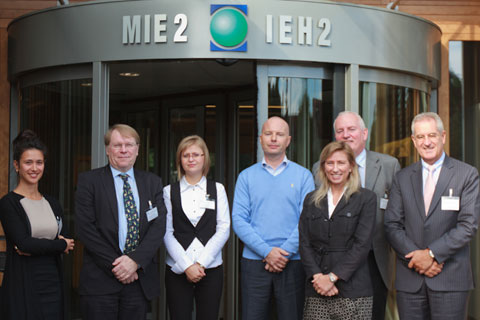 |
As a follow up to the CLI decision requesting the Secretariat to promote cooperation between existing enforcement networks, a meeting of enforcement networks and enforcement organizations hosting enforcement networks was held on 2-3 October 2012 in Geneva, Switzerland.
Meeting of Enforcement Networks
As a follow up to the CLI decision requesting the Secretariat to promote cooperation between existing enforcement networks, a meeting of enforcement networks and enforcement organizations hosting enforcement networks was held on 2-3 October 2012 in Geneva, Switzerland.
|
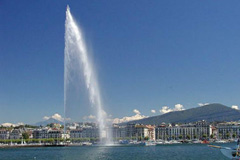 |
Geneva, Switzerland, 25 - 28 September 2012.
Documents pertaining to the meeting will be posted on the Basel Convention website as they become available.
Eighth meeting of the Open-ended Working Group of the Basel Convention (OEWG 8)
Geneva, Switzerland, 25 - 28 September 2012.
Documents pertaining to the meeting as well as additional information will be posted on the Basel Convention website as they become available.
|
 |
The Working Group will consider several scientific and technical, legal and strategic matters.
Press Advisory: Eighth meeting of the Basel Convention’s Open-ended Working Group
 19 September 2012, Geneva – The eighth meeting of the Open-ended Working Group of the Basel Convention will be held from 25 to 28 September 2012 at the Geneva International Conference Centre (CICG), in Geneva, Switzerland.
The Working Group will consider several scientific and technical, legal and strategic matters, including the development of the technical guidelines on transboundary movement of e-waste, in particular regarding the distinction between waste and non-waste; development of the technical guidelines on persistent organic pollutants; and the proposals for new entries to the list of wastes contained in Annex IX to the Basel Convention submitted by Finland, Ireland, and the Netherlands. As a follow-up to the Indonesian-Swiss country-led initiative to improve the effectiveness of the Basel Convention adopted at COP10 of the Convention, a progress report on the development of guidelines for environmentally sound management of waste will be provided, and the report on the interpretation of certain terminology to provide further legal clarity will be considered.
The outcomes of the meeting will help set the stage for the 11th meeting of the Conference of the Parties to the Basel Convention, which will be held back-to-back with the conferences of the parties to the Rotterdam and Stockholm conventions during a two-week period from 28 April to 10 May 2013 in Geneva. These back-to-back conferences will be held for the first time in tandem with an extra-ordinary meeting of the conferences of the parties charged with solidifying synergies among the three conventions.
For more information, see www.basel.int.
Note for editors:
The Open-ended Working Group, one of the subsidiary bodies of the Basel Convention, assists the Conference of the Parties in developing and keeping under continuous review the implementation of the Convention’s work plan, specific operational policies and decisions taken by the Conference of the Parties for the implementation of the Convention. It is mandated by the Conference of the Parties to advise the Conference of the Parties on issues relating to policy, technical, scientific, legal, institutional, administration, finance, budgetary and other aspects of the implementation of the Convention, including identification of the specific needs of different regions and subregions for training and technology transfer and to consider ways and means of ensuring the establishment and functioning of the Basel Convention Regional Centres for Training and Technology Transfer.
The Open-ended Working Group is co-chaired by Ms. Jimena Nieto Carrasco (Colombia) and Mr. Luay s. Al-Mukhtar (Iraq).
Contact:
Kei Ohno, Programme Officer, Secretariat of the Basel, Rotterdam and Stockholm Conventions (UNEP), Geneva, tel. +41 (22) 917 8201, e-mail: kohno@pops.int
Michael S. Jones, Public Information Officer, Secretariat of the Basel, Rotterdam and Stockholm Conventions (UNEP), Geneva, tel. +41-22-917-8668; (m) + 41-79-730-4495, e-mail: SafePlanet@unep.org
|
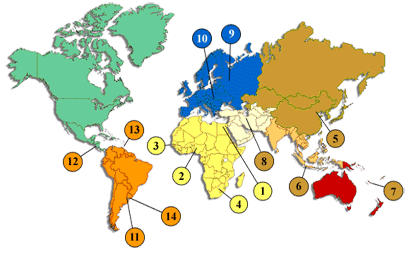 |
The meeting of the Basel and Stockholm convention regional centres was held from 1 to 2 Oct 2012, followed by a joint meeting with FAO and UNEP regional offices on 3 Oct 2012.
Joint meetings of the Basel and Stockholm convention regional centres and FAO and UNEP regional offices
The meeting of the Basel and Stockholm convention regional centres was held from 1 to 2 Oct 2012, followed by a joint meeting with FAO and UNEP regional offices on 3 Oct 2012.
|
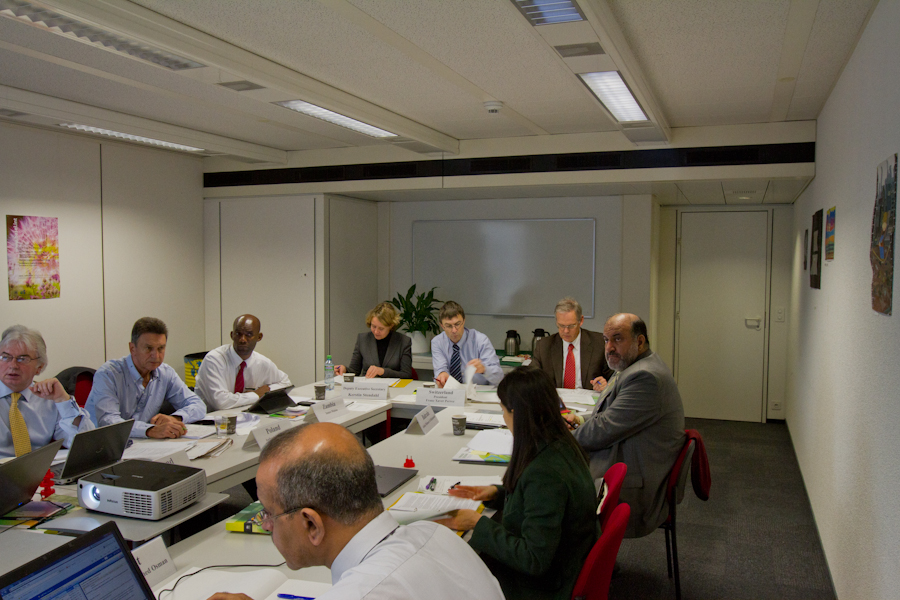 |
Expanded Bureau makes preparations for upcoming ordinary and extraordinary meetings of the Conference of the Parties.
Expanded Bureau agrees to COP-11 provisional agenda
Expanded Bureau makes preparations for upcoming ordinary and extraordinary meetings of the Conference of the Parties.
|
 |
The technical guidelines to properly manage wastes consisting of elemental mercury and wastes containing or contaminated with mercury aim to protect human health and the environment.
Technical guidelines for the environmentally sound management of wastes with mercury
The technical guidelines to properly manage wastes consisting of elemental mercury and wastes containing or contaminated with mercury aim to protect human health and the environment.
|
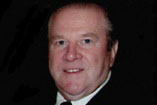 |
It is with deep sadness that we at the Secretariat of the Basel, Rotterdam and Stockholm Conventions learnt of the death of Mr. John Myslicki, a lifelong champion of the Basel Convention. John died in the presence of his family at the age of 64 on 18 August 2012.
Message of Condolence to the Family, Friends and Colleagues of the Late John Myslicki
 It is with deep sadness that we at the Secretariat of the Basel, Rotterdam and Stockholm Conventions learnt of the death of Mr. John Myslicki, a lifelong champion of the Basel Convention. John died in the presence of his family at the age of 64 on 18 August 2012.
In a career spanning several decades, John contributed immensely to the development of the Basel Convention, participating first as a negotiator of the Convention and later serving on the Canadian delegation. He also acted as an informal historian of the Basel Convention, documenting its early genesis and negotiation. John later lent his invaluable experience to the Mobile Phone Partnership Initiative and the Partnership for Action on Computing Equipment (PACE).
We have lost a friend and a colleague who always worked towards the goal of a better environment. His enthusiasm was and remains a guide for us to continue this work. We all will miss John.
To the family, friends and colleagues of John Myslicki, we wish to express our deepest sympathy for your loss. We share in your sorrow with respect, friendship and support.
|
|
The Working Group will consider several scientific and technical, legal and strategic matters, including the development of the technical guidelines on transboundary movement of e-waste, in particular regarding the distinction between waste and non-waste; development of the technical guidelines on persistent organic pollutants; and the proposals for new entries to the list of wastes contained in Annex IX to the Basel Convention submitted by Finland, Ireland, and the Netherlands.
Basel Convention Open-ended Working Group to review framework for environmental sound management of wastes
The eighth meeting of the Open-ended Working Group of the Basel Convention is being held from 25 to 28 September 2012 at the Geneva International Conference Centre (CICG), in Geneva, Switzerland.
The Open-ended Working Group keeps under continuous review the implementation of the Convention’s work plan, specific operational policies and decisions taken by the Conference of the Parties for the implementation of the Convention. It meets once every two years.
The Working Group will consider several scientific and technical, legal and strategic matters, including the development of the technical guidelines on transboundary movement of e-waste, in particular regarding the distinction between waste and non-waste; development of the technical guidelines on persistent organic pollutants; and the proposals for new entries to the list of wastes contained in Annex IX to the Basel Convention submitted by Finland, Ireland, and the Netherlands.
As a follow-up to the Indonesian-Swiss country-led initiative to improve the effectiveness of the Basel Convention adopted at COP10 of the Convention, a progress report on the development of guidelines for environmentally sound management of waste will be provided, and the report on the interpretation of certain terminology to provide further legal clarity will be considered.
The outcomes of the meeting will help set the stage for the 11th meeting of the Conference of the Parties to the Basel Convention, which will be held back-to-back with the conferences of the parties to the Rotterdam and Stockholm conventions during a two-week period from 28 April to 10 May 2013 in Geneva. These back-to-back conferences will be held for the first time in tandem with an extra-ordinary meeting of the conferences of the parties charged with solidifying synergies among the three conventions.
|
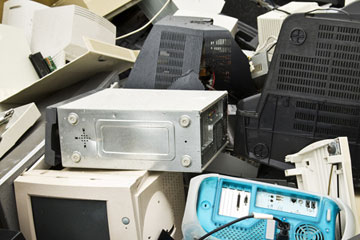 |
Research conducted by the Basel Convention provided the backdrop to a new directive on waste electrical and electronic equipment.
New European Union Directive on E-waste Comes Into Force
Research conducted by the Basel Convention provided the backdrop to a new directive on waste electrical and electronic equipment.
|
 |
The benefits of ship dismantling, or recycling, derive from the materials and equipment comprising end-of-life ships, whose scrap steel, mechanical parts and other valuable equipment are recycled or refurbished for use in other industries. End-of-life ships also comprise of an array of hazardous materials – such as asbestos, PCB and waste oils – which can have serious implications for the environment and human health if not managed properly.
Concern over ship dismantling practices prompts capacity building initiatives
 The benefits of ship dismantling, or recycling, derive from the materials and equipment comprising end-of-life ships, whose scrap steel, mechanical parts and other valuable equipment are recycled or refurbished for use in other industries. End-of-life ships also comprise of an array of hazardous materials – such as asbestos, PCB and waste oils – which can have serious implications for the environment and human health if not managed properly.
Concern has been expressed at the international level over the environmental, health and safety standards in this industry, particularly in those countries employing the beaching method of ship recycling. Ship recycling commonly takes place in developing countries which tend to have a competitive advantage as they provide a pool of low cost labour, may have weaker environmental protection / worker health and safety regulations, and have national demand for the outputs of the activity (predominantly scrap steel). Poor enforcement of regulations relating to this activity means that problems with local environmental pollution are commonplace and incidents of worker injury and fatality are high. These concerns are compounded given the upward trend in recycling activity experienced in the past few years.
The Basel Convention has been involved in the issue of ship dismantling for over a decade and works at the policy and technical levels and through its capacity building programme toward improving environmental, health and safety standards in this important industry.
|
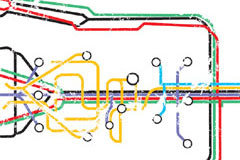 |
Vital Waste Graphics 3 charts global trends and sheds light on the obstacles that prevent the practical implementation of waste minimization, recycling and resource recovery.
UN report graphs global waste challenges
 A new report, Vital Waste Graphics 3, charts global trends and sheds light on the obstacles that prevent the practical implementation of policies to promote waste minimization, recycling and resource recovery.
Vital Waste Graphics 3 covers a wide-range of waste-related topics, including preventive tools for wastes; the market for clean-up and treatment of hazardous waste and recycling of scrap metals; biogas and compost; solid waste management; waste external costs to health, biodiversity, climate change, and land use; producer and consumer responsibility; food waste; green procurement; disasters and waste; waste crime and illegal traffic.
The report’s message is presented through more than 70 charts and graphs that reveal, explain and communicate connections between the environment and society.
Vital Waste Graphics 3 draws and maps a broader vision of the present and for the future, in order to raise awareness of the costs and consequences of generating waste, and the opportunities of minimizing and managing it in an environmentally and socially responsible manner.
Already, the livelihoods of 15 million people worldwide – and one to two percent of the urban population in some developing countries – depend on waste picking or the scavenging of waste. Protective measures for waste workers and nearby inhabitants, pollution control systems and risk mitigation measures are often insufficient in low-income countries.
Manufacturing products according to “green design” principles which integrate environmental and health considerations into their design, improved product labeling and certification of waste are among the measures that could protect health and environment, boost recycling rates, and contribute to turning waste into revenue and resources for other economic activities.
Vital Waste Graphics 3 is available here.
|
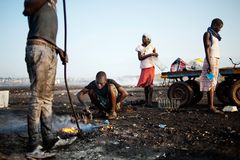 |
Pan-African Forum on E-Waste Underlines Green Economy Opportunities in E-Waste Sector
UN-led Meeting Agrees on Priority Actions for Managing E-Waste in Africa
 Pan-African Forum on E-Waste Underlines Green Economy Opportunities in E-Waste Sector
Nairobi, 16 March 2012 - Priority actions for reducing the environmental and health impacts of growing levels of electrical and electronic waste (e-waste), alongside promoting the sector's potential for green jobs and economic development, were today agreed by representatives from 18 African states, the United Nations, non-governmental organizations, the private sector and academia.
The actions were agreed on the final day of the Pan-African Forum on E-Waste, which was held at the Nairobi headquarters of the United Nations Environment Programme (UNEP).
Organized by the Secretariat of the Basel Convention and UNEP, with support from the Government of Kenya, and private sector companies including Dell, HP, Nokia and Philips, the forum was the first event of its kind on the continent. It focused on long-term solutions to the rising levels of obsolete mobile phones, refrigerators, televisions and other e-products in Africa.
Increasing domestic consumption of electronic products, coupled with the ongoing import of waste electronics into Africa from other regions, means that the continent is set to generate a higher volume of e-waste than Europe by 2017.
The Pan-African Forum on E-Waste in Nairobi adopted a 'Call to Action', which outlines 8 priority areas to improve the environmentally-sound management of e-waste in Africa.
These include:
- Implementation and enforcement by African states of the Basel Convention on the Control of Transboundary Movements of Hazardous Wastes and their Disposal and the Bamako Convention, which bans the import of hazardous wastes into Africa
- Development of national systems to improve the collection, recycling, transport, storage and disposal of e-waste
- National institutions to co-operate with multiple stakeholders (UN, NGOs, private sector and others) in producing e-waste assessments
- Recognition that the safe and sustainable recycling of e-waste provides an opportunity for green jobs and poverty reduction
- Awareness raising activities on environmental and health hazards linked to the unsound management of e-waste
"Managing e-waste, and other kinds of waste, is essential for the transition to a low-carbon, resource-efficient Green Economy", said UN Under-Secretary-General and UNEP Executive Director Achim Steiner.
"Sustainable management of e-waste can combat poverty and generate green jobs through recycling, collection and processing of e-waste - and safeguard the environment and human health from the hazards posed by rising levels of waste electronics. With just over three months until the Rio+20 conference in Brazil, this event has underlined how smart public policies, creative financial incentives and technology transfer can turn e-waste from a challenge into an important resource for sustainable development," added Mr. Steiner.
He highlighted that global recycling rates of some e-waste metals-known as rare earth metals-can be as low as one per cent despite these metals being crucial for components in hybrid electric car batteries to the magnets in wind turbines.
"The future of the clean tech, high-tech products and the transition to a Green Economy may in part depend on boosting the recycling of e-waste in order to assure a steady and streamlined supply of these specialty metals for these 21st century industries," added Mr Steiner.
As well as serving as a valuable source of secondary raw materials, the recovery and recycling of e-waste can reduce pressure on scarce natural resources and contribute to emissions reductions.
"One tonne of obsolete mobile phones contains more gold than one tonne of ore and the picture is similar for other precious substances", said Katherina Kummer-Peiry, Executive Secretary of the Basel Convention.
"If you consider the value of these materials, then this represents an important economic opportunity. There are recyclers and other industrial sectors who are interested in taking advantage of such opportunities, which can in turn create green jobs and support sustainable development."
Delegates at the Pan-African E-waste Forum underlined the importance of improved access to Information and Communication Technology (ICT) in Africa towards achieving the United Nations Millennium Development Goals.
But the disposal of obsolete electronic equipment can pose significant environmental and health risks. E-waste can contain hazardous substances, including heavy metals such as mercury and lead, and endocrine disrupting substances such as brominated flame retardants.
Much of the recycling of e-waste that takes place in Africa today occurs on an informal basis - often on uncontrolled dumpsites or landfills. Hazardous substances can be released during these dismantling and disposal operations. Open burning of cables, for example, is a major source of dioxin emissions; a persistent organic pollutant that travels over long-distances and can end up in food chain.
Attendees at the Pan-African E-Waste Forum underlined the fact that recycling and recovery activities need to move from the unregulated, informal sector, where health and environmental risks are high, to a more regulated system using international recycling standards.
"Africa's environmental challenges are growing by the day. This includes the exponential growth of electronic waste," said Ali D. Mohamed, Permanent Secretary of the Ministry of Environment and Mineral Resources of Kenya.
"It is now the time for Africa to take action on addressing health and environmental problems as a result of current recycling practices, while creating jobs and business opportunities and alleviating poverty. We want to achieve this through an enforceable legislative framework," added Mr. Mohamed.
As part of the 'Call to Action', manufacturers, importers, re-sellers and other handlers of electrical and electronic products should be required to organize the collection, recycling and recovery of e-waste. The forum agreed that Extended Producer Responsibility (EPR) should be a key component of the environmentally sound management of e-waste.
Notes to Editors:
For more information on the Pan-African Forum on E-Waste, please visit: https://tinyurl.com/77xrsnm
UNEP Metals Recycling Report: https://www.unep.org/resourcepanel/metals_recycling/
Basel Convention Report, Where are WEEE in Africa? Findings from the Basel Convention E-waste Africa Programme, available at: www.basel.int
UNEP Report From E-Waste to Resources: https://www.unep.org/PDF/PressReleases/E-Waste_publication_screen_FINALVERSION-sml.pdf
Financial support for the Pan-African Forum on E-Waste was provided by the European Commission, the Governments of Norway and Canada, HP, Dell, Microsoft, Sims Recycling Solutions, Safaricom and the National Environmental Management Authority of Kenya.
The event was held in collaboration with BCCC-Nigeria, EMPA, IMPEL, Nokia, OKO-Institut, Solving the E-Waste Problem (StEP) and United Nations University.
Media Contacts:
Nick Nuttall, UNEP Division of Communication and Public Information Acting Director and Spokesperson, Tel. +41 795 965 737 or +254 733 632 755, e-mail: nick.nuttall@unep.org,
Bryan Coll, UNEP Newsdesk (Nairobi) on Tel. +254 207623088, Mobile: +254 731666214, Email: unepnewsdesk@unep.org
Michael Stanley-Jones, Public Information Officer, Secretariat of the Basel, Rotterdam and Stockholm Conventions, Tel. + 41-22-917-8668, Mobile + 41-79-730-4495, E-mail: msjones@pops.int
Photo: Kai Loeffelbein
|
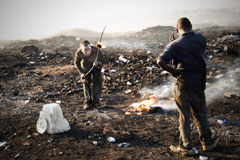 |
International collaboration to promote environmentally sound management of e-waste was strengthened with the signing of an agreement between the Basel Convention Secretariat and ITU aimed at protecting the environment.
UN system collaborates on electronic waste disposal
 ITU and Secretariat of the Basel Convention to protect environment from hazardous e-Waste
Geneva, 12 March 2012 - International collaboration to promote environmentally sound management of e-waste was strengthened with the signing of an agreement between the Secretariat of the Basel Convention (SBC) and ITU aimed at protecting the environment from the adverse effects of e-Waste.
The rapid spread of electrical and electronic equipment (EEE) has raised public attention on the negative effects arising from inadequate disposal and waste management. Electronic waste, which contains toxic materials used in the manufacturing process, can cause widespread damage to the environment and human health. The ITU-SBC collaboration seeks to collect and recycle the hazardous materials by introducing safeguards in the management of the waste of electrical and electronic equipment (WEEE), or e-Waste.
Developing countries are expecting a surge in e-Waste, with mobile phone waste expected to grow exponentially. Sharp increases of e-Waste have until now not been matched with policy and regulatory mechanisms nor with infrastructure to cope with the influx in developing countries. Currently, only 13 per cent of e-Waste is reported to be recycled with or without safety procedures.
The issue of e-Waste as an emerging telecommunications policy and regulatory issue has received recognition at the highest level in ITU. Key examples of ITU´s activities in this area include:
- The adoption of Recommendation ITU-T L.1000, “Universal power adapter and charger solution for mobile terminals and other ICT devices”, which dramatically reduces production and cuts the waste produced by mobile chargers.
- The adoption of Recommendation ITU-T L.1100, which details the procedures to be employed when recycling rare metal components included in ICT equipment.
- Designing e-Waste management strategies for environmental protection; publishing and disseminating best practices; and assisting countries in the drafting, adoption and implementation of policies, laws, and regulations related to e-Waste management.
At the level of global environmental policy, the Basel Convention on the Control of Transboundary Movements of Hazardous Wastes and their Disposal, which came into force in 1992, is the most comprehensive environmental agreement on the management of hazardous and other waste. But many countries have not yet successfully translated its provisions into their national legislation. Now, with the signing of the ITU-SBC Administrative Agreement, efforts between both UN mechanisms will be leveraged, maximizing value at the global level and strengthening collaboration between telecommunication/ICT and environmental policy makers for the global good.
“The ICT sector is already making significant progress in improving its environmental performance and reducing e-Waste through improved best practices and standards,” stated ITU Secretary-General Hamadoun Touré. “The collaboration with the Secretariat of the Basel Convention will allow the global community to address this ever-increasing problem through a holistic approach, involving the recycling industry as well as environmental policy makers.”
“The positive impact of ICT on development, particularly in developing countries and countries with economies in transition is well recognized and acknowledged,” said Mr Jim Willis, Executive Secretary of the Basel, Rotterdam and Stockholm Conventions. “However, ICT equipment has to be dealt with in view of its entire life-cycle, and this includes the time when the equipment comes to its end-of-life and becomes e-Waste. Collaboration between ITU and SBC will further our shared objectives in support of sustainable development that essentially includes environmentally sound management of waste.”
ITU and SBC have agreed to cooperate through regular dialogues and meetings; exchange of information, practices, experiences and materials; coordination of activities in areas of mutual interest, including development of green ICT standards, international cooperation and capacity building; and execution of supplementary activities, projects and programmes.
For more information, please contact:
Sanjay Acharya
Chief, Media Relations and Public Information
International Telecommunication Union
E-mail: sanjay.acharya@itu.int
Tel: +41 22 730 5046
Mobile: +41 79 249 4861
Matthias Kern
Senior Programme Officer
Secretariat of the Basel Convention
E-mail: matthias.kern@unep.org
Tel: +41 22 917 8767
About ITU
ITU is the leading United Nations agency for information and communication technology. For over 145 years, ITU has coordinated the shared global use of the radio spectrum, promoted international cooperation in assigning satellite orbits, worked to improve communication infrastructure in the developing world, and established the worldwide standards that foster seamless interconnection of a vast range of communications systems. From broadband networks to new-generation wireless technologies, aeronautical and maritime navigation, radio astronomy, satellite-based meteorology and converging fixed-mobile phone, Internet and broadcasting technologies, ITU is committed to connecting the world.
www.itu.int
Facebook: www.itu.int/facebook
Twitter: www.itu.int/twitter
About Basel Convention
The Basel Convention on the Control of Transboundary Movements of Hazardous Wastes and their Disposal was adopted in 1989 and entered into force in 1992. It protects human health and the environment against the adverse effects resulting from the generation, management, transboundary movements and disposal of hazardous and other wastes. The Convention currently has 178 member countries (Parties).
www.basel.int
Photo copyright: Kai Loeffelbein
|
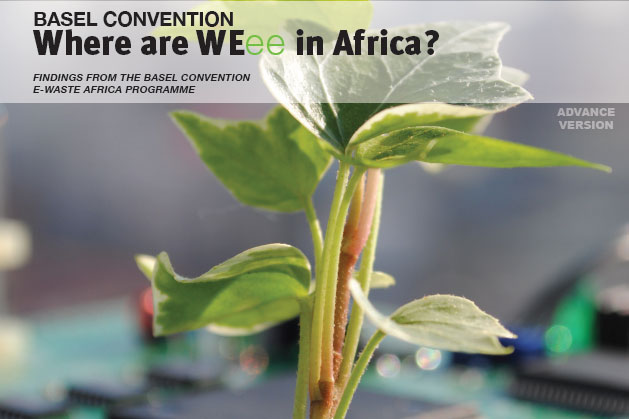 |
UN Report Finds Imports of Waste Electronics from Europe Continue to Add to Problem
Domestic Consumption is Main Contributor to Africa’s Growing E-Waste
 UN Report Finds Imports of Waste Electronics from Europe Continue to Add to Problem
Geneva, 10 February 2012 – West Africa faces a rising tide of e-waste generated by domestic consumption of new and used electrical and electronic equipment, according to a new United Nations report.
Domestic consumption makes up the majority (up to 85 percent) of waste electronic and electrical equipment (WEEE) produced in the region, according to the study, Where are WEEE in Africa?
The e-waste problem in West Africa is further exacerbated by an ongoing stream of used equipment from industrialised countries, significant volumes of which prove unsuitable for re-use and contribute further to the amount of e-waste generated locally.
In the five countries studied in the UN report (Benin, Côte d’Ivoire, Ghana, Liberia, and Nigeria), between 650,000 and 1,000,000 tonnes of domestic e-waste are generated each year, which need to be managed to protect human health and the environment in the region.
Where are WEEE in Africa? sheds light on current recycling practices and on socio-economic characteristics of the e-waste sector in West Africa. It also provides the quantitative data on the use, import and disposal of electronic and electrical equipment in the region.
The report draws on the findings of national e-waste assessments carried out in the five countries from 2009 to 2011.
"Effective management of the growing amount of e-waste generated in Africa and other parts of the world is an important part of the transition towards a low-carbon, resource-efficient Green Economy”, said United Nations Environment Programme (UNEP) Executive Director and UN Under-Secretary General Achim Steiner.
“We can grow Africa’s economies, generate decent employment and safeguard the environment by supporting sustainable e-waste management and recovering the valuable metals and other resources locked inside products that end up as e-waste. In the run-up to Rio+20 in June, this report shows how measures such as improved collection strategies and establishing more formal recycling structures, can limit environmental damage and provide economic opportunities,” added Mr. Steiner.
Risks and Opportunities of E-Waste
The use of electrical and electronic equipment is still low in Africa compared to other regions of the world, but it is growing at a staggering pace. The penetration rate of personal computers in Africa, for example, has increased by a factor of 10 in the last decade, while the number of mobile phone subscribers has increased by a factor of 100.
Electrical and electronic equipment can contain hazardous substances (e.g. heavy metals such as mercury and lead, and endocrine disrupting substances such as brominated flame retardants).
Hazardous substances are released during various dismantling and disposal operations and are particularly severe during the burning of cables to liberate copper and of plastics to reduce waste volumes. Open burning of cables is a major source of dioxin emissions, a persistent organic pollutant that travels over long-distances that bio-accumulates in organisms up through the global food chain.
Electrical and electronic equipment also contains materials of strategic value such as indium and palladium and precious metals such as gold, copper and silver. These can be recovered and recycled, thereby serving as a valuable source of secondary raw materials, reducing pressure on scarce natural resources, as well as minimizing the overall environmental footprint.
The report, which was prepared by the Secretariat of the Basel Convention and partners, also documents the economic and environmental potential of building a sound resource recovery and waste management system for e-waste, along with the risks of continuing on the present course.
“E-waste is the fastest growing waste stream world-wide and a key waste stream under the Basel Convention. Dealing with electronic and electrical equipment properly presents a serious environmental and health challenge for many countries, yet also offers a potentially significant opportunity to create green businesses and green jobs,” said Jim Willis, Executive Secretary of the Basel, Rotterdam and Stockholm Conventions.
The report examined the flows of EEE and e-waste between Europe and West Africa. Among the major findings:
- In Ghana in 2009, investigators found that around 70% of all EEE imports were used EEE; 30% of second-hand imports were estimated to be non-functioning (therefore e-waste), producing about 40,000 tonnes of e-waste in 2010.
- Field investigations in Benin and Côte d’Ivoire have shown that about half of the imported used EEE is actually non-functional and non-repairable, thus defined as import of e-waste.
- An analysis of 176 containers of two categories of used electrical and electronic equipment imported into Nigeria, conducted from March to July 2010, revealed that more than 75% of all containers came from Europe, approximately 15% from Asia, 5% from African ports (mainly Morocco) and 5% from North America. A similar distribution could be observed in Ghana, where 85% of used EEE imports originated in Europe, 4% in Asia, 8% in North America, and 3% from other destinations.
- The UK is the dominant exporting country to Africa for both new and used EEE, followed with large gaps by France and Germany. Nigeria is the most dominant African importing country for new and used EEE, followed by Ghana.
- The amount of e-waste generated in Benin, Côte d’Ivoire, Ghana, Liberia, and Nigeria from the consumption of new or used EEE of good quality with a reasonable life-span is comparable to the total amount of e-waste generated in Belgium or the Netherlands, and equates to approximately 5% of all e-waste generated in the European Union.
Child Labour Concerns
The exposure to hazardous substances in and around dismantling sites causes manifold health and safety risks for collectors, recyclers and neighbouring communities. Children’s health in particular may be at risk. Child labour is common in West Africa’s scrap metal business, the report’s investigators found. Collection and dismantling activities are carried out by children from the age of 12, however younger children from the age of five are sometimes engaged in light work, including dismantling of small parts and sorting of materials.
In contrast to the informal recycling sector, where collection and recycling of e-waste is almost exclusively carried out by individuals largely consisting of migrant labourers who are often stigmatized in African societies as ‘scavengers’, refurbishment is viewed as a relatively attractive economic opportunity for an increasingly well-educated, semi-professional labour force. In Accra (Ghana) and Lagos (Nigeria), the refurbishing sector provides income to more than 30,000 people.
“Sustainable solutions for e-waste management in Africa require measures aimed at imports and exports control, collection and recycling, policy and legislation that incorporate extended producer responsibility, recognize the important role of the informal sector, promote awareness raising and education, as well as compliance monitoring and enforcement. Appropriate health and safety measures for those involved in recycling, as well as environmentally sound practices, should be ensured,” said Prof. Oladele Osibanjo, Director of Basel Convention Regional Coordinating Center for Africa, a co-author of the report.
Copies of the report, Where are WEEE in Africa? Findings from the Basel Convention E-waste Africa Programme, can be downloaded from www.basel.int
Note to Editors
The report was prepared by the Secretariat of the Basel Convention in cooperation with the Basel Convention Regional Coordinating Centre for the African Region (BCCC-Nigeria) based in Nigeria and the Basel Convention Regional Centre for French-speaking countries in Africa (BCRC-Senegal) based in Senegal, the Swiss Federal Laboratories for Materials Science and Technology (EMPA), the Institute for Applied Ecology (the Öko-Institut), the European Union Network for the Implementation and Enforcement of Environmental Law (IMPEL) and the governments of Benin, Côte d’Ivoire, Egypt, Ghana, Liberia, Nigeria, and Tunisia.
The Basel Convention E-waste Africa Programme aims at enhancing the environmental governance of e-wastes and creating favourable social and economic conditions for partnerships and small businesses in the recycling sector in Africa. The initial phase of the programme consists of the E-waste Africa project and complementary activities triggered by the project and implemented by partner organizations.
The overarching goal of the E-waste Africa project is to enhance the capacity of West Africa and other African countries to tackle the growing problem of e-waste and thereby protect the health of citizens, particularly children, while providing economic opportunities. Specifically, the project aims to improve the level of information available on flows of EEE and e-waste imported into West African countries; assess the baseline situation in terms of amounts of EEE imports, EEE in use and e-waste in partner countries, as well as environmental impacts of the e-waste sector; study the social-economic aspects of the increasing volumes of used EEE and e-waste; and strengthen national capacities to monitor and control transboundary movements of e-waste and to prevent illegal traffic.
Waste electronic and electrical equipment (WEEE) is a priority waste stream addressed by the Basel Convention on the Control of Transboundary Movement of Hazardous Wastes and Their Disposal. The Secretariat of the Basel, Rotterdam and Stockholm Conventions is administered by the UN Environment Programme (UNEP). The Convention entered into force in 1992.
The Ban Amendment to the Basel Convention prohibits the export of hazardous waste from OECD to non-OECD countries. It was adopted in 1995, but has yet to enter into force. Parties reaffirmed their support for the amendment at their 10th meeting in October 2011 by adopting a decision that is widely expected to speed the Ban Amendment’s ratification and entry into force.
The Cartagena Declaration on prevention and minimization of hazardous wastes, also adopted by the Parties at their 10th meeting, reaffirms that the Basel Convention is the primary global legal instrument for guiding the environmentally sound management of hazardous and other wastes and their disposal, including efforts to prevent and minimize their generation, and efficiently and safely manage those that cannot be avoided. The hazardous waste challenge, it declares “is best addressed through the avoidance of the use of hazardous substances in products and processes as well as through production methods that avoid and prevent waste generation.”
The Convention on the Ban of the Import into Africa and the Control of the Transboundary Movement and Management of Hazardous Waste within Africa (Bamako Convention) was adopted in 1991 and entered into force in 1998. The Bamako Convention incorporates the prohibition of all imports of hazardous waste into those countries which are Parties, but unlike the Basel Convention does not exclude certain hazardous wastes (e.g. radioactive wastes). All 53 member States of the Organization of African Union (OAU) are parties to the Bamako Convention.
For more information, please contact:
Nick Nuttall, UNEP Division of Communication and Public Information Acting Director and Spokesperson, Tel. +41 795 965 737 or +254 733 632 755, e-mail: nick.nuttall@unep.org,
Michael Stanley-Jones, Public Information Officer, Secretariat of the Basel, Rotterdam and Stockholm Conventions, + 41-22-917-8668; (m) + 41-79-730-4495, e-mail: SafePlanet@unep.org,
Tatiana Terekhova, Programme Officer, Secretariat of the Basel, Rotterdam and Stockholm Conventions, + 41-22-917-8340, e-mail: Tatiana.Terekhova@unep.org
Télécharger la version française du communiqué de presse.
|
 |
The UNEP Secretariat of the Basel Convention is pleased to announce that it is joining the Partnership on Measuring ICT for Development.
Basel joins the Partnership on Measuring ICT for Development
 Port Louis, Mauritius (7 December 2011) – The UNEP Secretariat of the Basel Convention is pleased to announce that it is joining the Partnership on Measuring ICT for Development.
In a statement issued on the opening day of the International Telecommunication Union’s World Telecommunications/ICT Indicators Meeting on 7 December 2011, Mr Torbjorn Fredriksson, Chief of the ICT Analysis Section of the UN Conference on Trade and Development (UNCTAD) said,
“The inclusion of the Basel Convention Secretariat is particularly valuable at a time when growing attention is being paid to the measurement of the environmental implications for ICT, such as the growth of electronic waste “ said the current chair of the Partnership Steering Committee.
“The Secretariat of the Basel Convention will bring to the Partnership on Measuring ICT for Development its expertise and experience with e-waste issues on global level, its network of national and international institutions, academics, industry and civil society,” commented Mr Matthias Kern, who will be representing the Basel Convention Secretariat in the Partnership.
“Measuring e-waste is one of the emerging topics we are exploring at this year’s World Telecommunication/ICT Indicators Meeting. I am extremely pleased to announce the new membership of the UNEP Secretariat of the Basel Convention at this occasion,” said Ms Susan Teltscher, Head of ITU’s ICT Data and Statistics Division.
ITU, the Basel Convention Secretariat and the United Nations University are conducting a joint online survey on e-waste – https://www.surveymonkey.com/s/ewastesurvey2011 – through 31 January 2012.
|